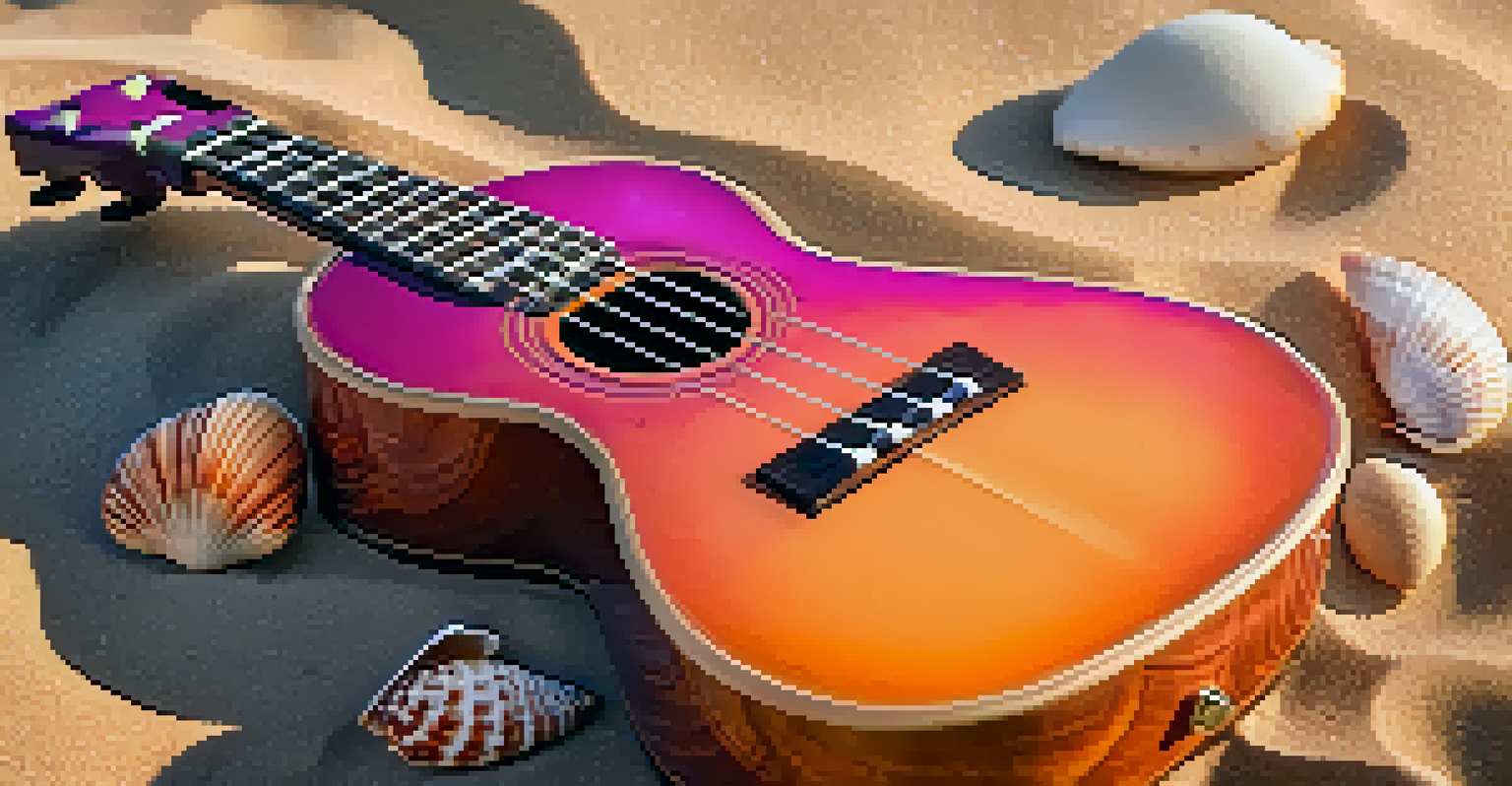From Hawaii to Protests: The Ukulele's Cultural Journey

The Origins of the Ukulele in Hawaii
The ukulele, often affectionately called the 'uke', has its roots embedded deep in Hawaiian culture. It was introduced to the islands in the late 19th century by Portuguese immigrants, who brought with them a small guitar-like instrument called the braguinha. This instrument quickly evolved, blending local Hawaiian music styles with the new influences, creating a unique sound that resonated with island life.
The ukulele is a happy instrument, and it brings the joy of music to everyone who plays it.
Hawaiians embraced the ukulele with open arms, and it became a staple at family gatherings, celebrations, and traditional luaus. Its cheerful tone and portability made it an ideal companion for storytelling and dance, essential elements of Hawaiian cultural expression. As it gained popularity, the ukulele became synonymous with the spirit of aloha, representing warmth, joy, and community.
In the early 20th century, the ukulele began its journey beyond Hawaii, sparking interest in mainland America and beyond. This transition marked the beginning of its cultural evolution, leading to new genres and styles that would expand its reach across the globe.
The Ukulele's Rise in Popularity in America
The ukulele made its way to the American mainland during the early 1900s, capturing the hearts of musicians and entertainers alike. Its catchy sound was featured in vaudeville shows and jazz bands, allowing it to carve out a niche in the vibrant musical landscape of the time. Iconic figures like Cliff Edwards, known as 'Ukelele Ike', helped popularize the instrument through their performances.

With the rise of radio and film, the ukulele's exposure grew exponentially. It became a symbol of fun and leisure during the Roaring Twenties, as people flocked to beaches and backyard parties, eager to strum the cheerful tunes of the ukulele. This era solidified the instrument's place in American popular culture, making it a beloved choice for aspiring musicians.
Ukulele's Hawaiian Roots
The ukulele, introduced by Portuguese immigrants, became a central part of Hawaiian culture, symbolizing joy and community.
As the decades passed, the ukulele continued to evolve, influencing various music genres from rock to folk. It became a versatile tool for self-expression, appealing to both seasoned musicians and casual players, which further fueled its popularity across diverse audiences.
The Ukulele in the 1960s: A Voice for Change
The 1960s marked a significant turning point for the ukulele, as it became intertwined with various social movements and artistic expressions. Folk music's resurgence brought the instrument back into the spotlight, with artists like Pete Seeger and the Kingston Trio using it as a vehicle for their messages of peace and social justice. The ukulele's simple design made it accessible for anyone wanting to join the movement.
Music is a universal language, and the ukulele is a bridge that connects people from all walks of life.
This era also saw the emergence of the 'protest song', where the ukulele played a vital role in conveying messages of hope and resistance. Its lighthearted sound often contrasted with the serious themes of the lyrics, creating a powerful emotional impact. The juxtaposition of the cheerful ukulele against poignant messages resonated with audiences, making it a symbol of both joy and activism.
The ukulele became a bridge, connecting generations and cultures through music that spoke to universal experiences of struggle and triumph. Its presence in protests and gatherings illustrated how a simple instrument could amplify the voices of those seeking change.
The Ukulele Today: A Global Phenomenon
Fast forward to the present day, and the ukulele has achieved global status, with enthusiasts spanning continents and cultures. Its appeal lies in its versatility; the instrument can be found in genres ranging from pop and rock to jazz and classical music. This has led to a growing community of musicians and learners who are eager to explore its unique sound.
Social media has played a significant role in the ukulele's resurgence, with platforms like YouTube showcasing countless tutorials, performances, and collaborations. This digital space has allowed people from all walks of life to connect, share their love for the instrument, and learn from one another. Viral challenges and trends have made the ukulele a fun and accessible entry point for new musicians.
Global Popularity Surge
From its early 20th-century rise in America to its current global status, the ukulele has evolved across various music genres.
Moreover, the ukulele has found its way into education, with many schools adopting it as a teaching tool. Its simplicity makes it an ideal instrument for young learners, fostering creativity and musicality in classrooms around the world. This educational aspect ensures that the ukulele's legacy will continue to flourish for generations to come.
Cultural Significance and Symbolism of the Ukulele
The ukulele is more than just an instrument; it embodies a rich cultural history and a spirit of unity. It symbolizes the fusion of different musical traditions, reflecting the diverse influences that have shaped its sound over the years. Each strum tells a story, connecting people across cultural and geographical boundaries.
In Hawaiian culture, the ukulele is often seen as a representation of aloha, embodying love, peace, and compassion. This cultural significance extends beyond Hawaii, as musicians worldwide adopt the instrument to express their own stories and experiences. The ukulele serves as a reminder of the power of music to unite individuals, regardless of their backgrounds.
Furthermore, the ukulele's lighthearted nature encourages a sense of joy and playfulness. It invites people to gather, share, and create together, fostering community and connection. Whether in a backyard jam session or a protest for change, the ukulele continues to resonate as a symbol of hope and togetherness.
The Future of the Ukulele: Trends and Innovations
As we look to the future, the ukulele is poised to undergo further transformations thanks to technological advancements and innovative musical explorations. The rise of electric ukuleles and digital effects has opened new avenues for creativity, allowing musicians to experiment with sound in ways never before possible. This fusion of traditional craftsmanship with modern technology is breathing new life into the instrument.
Moreover, the ukulele's presence in popular music shows no signs of waning. Contemporary artists are increasingly incorporating the ukulele into their work, creating fresh sounds that appeal to a new generation of listeners. Collaborations across genres are also on the rise, showcasing the instrument's versatility and adaptability in an ever-evolving music landscape.
Cultural Symbol of Unity
The ukulele embodies a rich cultural history and promotes connection, joy, and creativity among diverse communities worldwide.
As the ukulele continues to inspire and engage, its future remains bright. The instrument's ability to transcend cultural boundaries and connect people through music ensures that it will remain relevant and cherished for years to come.
Conclusion: The Enduring Legacy of the Ukulele
The journey of the ukulele from Hawaii to global stages is a testament to its enduring legacy and cultural significance. It has weathered the storms of time, shifting from a local Hawaiian instrument to a beloved symbol of joy, protest, and community. As we celebrate its rich history, we also embrace its role in shaping contemporary music.
The ukulele invites all to join in the celebration of life through music, reminding us of the shared experiences that bind us together. Whether you’re a seasoned player or a curious beginner, there’s a place for you in the ukulele community. Its cheerful melodies have the power to uplift spirits and foster connections, making it a truly universal instrument.

As we look to the future, the ukulele will undoubtedly continue to evolve, adapting to new musical landscapes while remaining true to its roots. Its story is far from over, and the next chapter is just waiting to be written by those who share its love and passion.